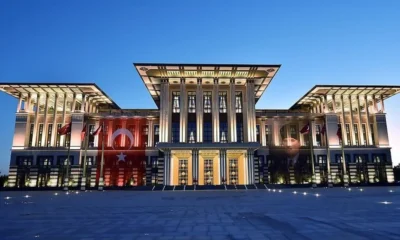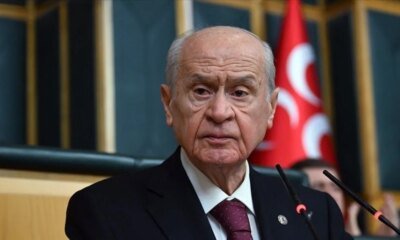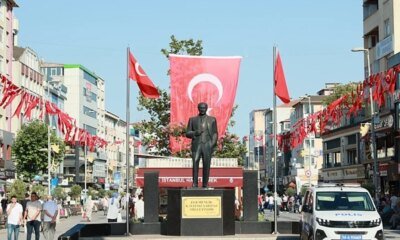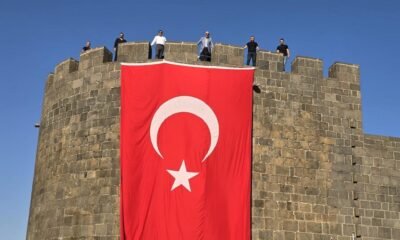Economy
Trump threatens Russia with tariffs over Ukraine war deadline
President Donald Trump on Monday warned he would slap tariffs on Russia unless the war in Ukraine is resolved within 50 days.
The Republican president made the announcement during an Oval Office meeting with NATO Secretary General Mark Rutte.
“We’re going to be doing very severe tariffs if we don’t have a deal in 50 days,” Trump said. He did not provide specifics on how the tariffs would be implemented.
“I use trade for a lot of things,” he added. “But it’s great for settling wars.”
Trump’s special envoy to Ukraine and Russia met with Ukraine President Volodymyr Zelenskyy in Kyiv on Monday, as anticipation grew over a possible shift in the Trump administration’s policy on the three-year war.
Trump last week said he would make a “major statement” on Russia on Monday. He was due to meet with NATO Secretary-General Mark Rutte in Washington. Rutte also planned to hold talks with U.S. Defense Secretary Hegseth and Secretary of State Marco Rubio, as well as members of Congress.
Trump made quickly stopping the war one of his diplomatic priorities, and he has increasingly expressed frustration about Russian President Vladimir Putin’s unbudging stance on U.S.-led peace efforts.
Trump has long boasted of his friendly relationship with Putin, and after taking office in January, repeatedly said that Russia was more willing than Ukraine to reach a peace deal. At the same time, Trump accused Zelenskyy of prolonging the war and called him a “dictator without elections.”
But Russia’s relentless onslaught against civilian areas of Ukraine wore down Trump’s patience. In April, Trump urged Putin to “STOP!” launching deadly barrages on Kyiv, and the following month said in a social media post that the Russian leader ” has gone absolutely CRAZY!” as the bombardments continued.
“I am very disappointed with President Putin, I thought he was somebody that meant what he said,” Trump said late Sunday. “He’ll talk so beautifully and then he’ll bomb people at night. We don’t like that.”
Zelenskyy said he and Trump’s envoy, retired Lt. Gen. Keith Kellogg, had “a productive conversation” about strengthening Ukrainian air defenses, joint arms production and purchasing U.S. weapons in conjunction with European countries, as well as the possibility of tighter international sanctions on the Kremlin.
“We hope for the leadership of the United States, because it is clear that Moscow will not stop unless its … ambitions are stopped by force,” Zelenskyy said on Telegram.
Russia has pounded Ukrainian cities, including the capital, Kyiv, with hundreds of drones and cruise and ballistic missiles that Ukraine’s air defenses are struggling to counter. June brought the highest monthly civilian casualties of the past three years, with 232 people killed and 1,343 wounded, the U.N. human rights mission in Ukraine said. Russia launched 10 times more drones and missiles in June than in the same month last year, it said.
Economy
Türkiye, Malaysia aim to strengthen cooperation in Islamic finance
Türkiye and Malaysia can and should work together in a time when the world is seeking more direction and clarity, the chairperson of a Malaysian center focusing on Islamic finance said in an interview published on Tuesday.
“Türkiye and Malaysia can and should work together in a time when the world is seeking more direction and clarity. We are in a phase where we must continue to build and strengthen our relations,” said Tan Sri Azman Mokhtar, the chairperson of Malaysia International Islamic Financial Centre (MIFC) Leadership Council (MLC).
Speaking to Anadolu Agency (AA), Mokhtar emphasized Türkiye’s significance, both in its region and globally, explaining that they aim to advance the strong economic, financial, and investment ties between Türkiye and Malaysia.
“The Future of Islamic Finance: Türkiye-Malaysia Business Forum” was held recently in cooperation with the Presidency’s Investment Office and MIFC MLC.
As part of the program, more than 20 senior financial representatives operating in areas such as Islamic banking, capital markets and takaful (Islamic insurance) came to Türkiye, along with heads of regulatory and supervisory institutions.
The program focused on promoting the Istanbul Financial Center (IFC), showcasing investment opportunities in Türkiye, strengthening public-private cooperation and evaluating investment prospects through one-on-one meetings.
Islamic finance, which has emerged in recent years as an alternative model, continues to grow and is expanding its influence, especially in the Gulf countries, Southeast Asia and Africa.
Due to its promotion of financial inclusion in developing countries and its foundation on ethical principles, Islamic finance is expected to become more widespread across broader geographies in the future. Türkiye stands out as a key part of this growing trend.
Legal reforms in participation finance, the establishment of new participation financial institutions, and the aim of turning Istanbul Financial Center into a global hub are all strengthening Türkiye’s Islamic finance ecosystem.
As of 2024, participation banking holds an 8.5% share in the country’s banking sector, and this is expected to reach double digits in the coming years.
Additionally, initiatives such as participation-based insurance, sukuk issuance (Islamic bonds) and the diversification of interest-free financial products support Türkiye’s goal of becoming a regional Islamic finance center.
In his remarks to AA, Mokhtar noted that trade between the two countries exceeds $5 billion (TL 200.87 billion), adding, however, that there is room to “grow this even further.”
“Our relationship is truly strong,” he said.
Mokhtar explained that in Malaysia, Islamic finance constitutes almost half of the banking system and two-thirds of the capital markets.
Highlighting Türkiye’s significance regionally and globally, Mokhtar added: “Malaysia currently holds the chairmanship of the Association of Southeast Asian Nations (ASEAN). Türkiye and Malaysia can and should work together in a time when the world is seeking more direction and clarity. We are in a process where we must continue to build and strengthen our relations.”
He also mentioned witnessing the development of the Istanbul Financial Center closely and recalled opening an office in Istanbul during his time as CEO of Khazanah Nasional to invest in Türkiye and the region, a branch that is still active today.
Moreover, he drew attention to Türkiye’s regional influence and its role in participation finance.
“Türkiye is not just about Türkiye. It is a bridge economy for Central Asia, Africa, the Middle East and North Africa. There is serious potential in the participation finance,” he remarked.
“Much of this potential is already being realized. As Malaysia, we will continue to be part of this bridge, just as we are in our own region,” he added.
Mokhtar emphasized that the global financial world is searching for direction, with ongoing issues and instability in monetary policy, climate initiatives, and environmental, social and governance (ESG) efforts.
He said that Islamic finance is rooted in social justice, and that they have transformed this tradition into a modern framework.
Highlighting the system’s growth potential, he added: “Islamic finance is growing much faster than the global financial system today, but in percentage terms, we are still relatively small. That means there is plenty of room for growth.”
Economy
Buoyed by exports, China’s economy expands 5.2% in Q2
China’s economy grew by more than 5% in the second quarter, despite global headwinds and tensions with the U.S., official data showed Tuesday, buoyed by strong exports, but analysts warned that more work was needed to address sluggish consumer demand.
The figures offer a rare bit of good news for the country’s leadership as it fights a multi-front battle to kickstart growth – a challenge made all the more difficult by U.S. President Donald Trump’s tariff war.
But the knock-on effects of the trade turmoil abroad and persistent sluggish consumption mean the economy could slump in the second half of year, analysts warned.
The U.S. president has imposed levies on China and most other major trading partners since returning to office in January, threatening Beijing’s exports just as it becomes more reliant on them to stimulate economic activity.
The two superpowers have sought to de-escalate their row after reaching a framework for a deal at talks in London last month, but observers warn of lingering uncertainty.
On Tuesday, Beijing’s National Bureau of Statistics (NBS) said the Chinese economy grew 5.2% from April to June, matching a prediction by an Agence France-Presse (AFP) survey of analysts and topping an official growth goal for the year set by the government.
But it marked a slowdown from the 5.4% seen in the first quarter, which was boosted by exporters rushing to shift goods ahead of swingeing U.S. tariffs kicking in.
“The national economy withstood pressure and made steady improvement despite challenges,” NBS deputy director Sheng Laiyun told a news conference.
“Production and demand grew steadily, employment was generally stable, household income continued to increase, new growth drivers witnessed robust development and high-quality development made new strides,” he said.
Markets were mixed in response – after a strong start to the day, Hong Kong pared an early rally while Shanghai dipped into negative territory.
“The figures probably still overstate the strength of growth,” Zichun Huang, China Economist at Capital Economics, said in a note.
“With exports set to slow and the tailwind from fiscal support on course to fade, growth is likely to slow further during the second half of this year,” Huang added.
Retail sales rose 4.8% on-year last month, below a forecast in a Bloomberg survey of economists, suggesting efforts to kickstart consumption have fallen flat.
The weak readings come as Beijing battles to shift towards a growth model propelled more by domestic demand than the traditional key drivers of infrastructure investment, manufacturing and exports.
Factory output, meanwhile, gained 6.8%, higher than the estimate – reflecting continued high demand for Chinese exports that has boosted growth.
‘More deflation’
But analysts warn that strong exports could be driving deflationary pressures and further dampening already sluggish consumer demand.
“Recent efforts to boost spending, such as the broadening of the consumer goods trade-in scheme earlier this year, did temporarily lift retail sales,” said Sarah Tan, an economist at Moody’s Analytics.
“However, this support proved unsustainable, with funding reportedly drying up in several provinces. The scheme’s limitations highlight the need for policymakers to address the deeper structural challenges behind consumer caution.”
Data last week showed consumer prices edged up in June, barely snapping a four-month deflationary dip, but factory gate prices dropped at their fastest clip in nearly two years.
“The economy posted a solid first half, supported by resilient exports, though this momentum is contributing to deepening deflationary trends,” Louise Loo, Head of Asia Economics at Oxford Economics, said in a note.
“The cost of strong exports is more deflation,” she said.
Disagreements also persist between Beijing and Washington, despite the framework agreement reached last month.
“We are resolved to handle our own affairs well,” The NBS’s Sheng said Tuesday, noting “high tariffs” and “pressure in the external environment”.
Yue Su, principal economist for China at the Economist Intelligence Unit, told AFP that Tuesday’s data demonstrated “notable resilience,” warning that “trade frontloading will overdraw demand for the second half.”
Economy
White House exploring authority to fire Fed’s Powell: Official
U.S. President Donald Trump could dismiss Federal Reserve (Fed) Chair Jerome Powell for cause if supported by evidence, White House economic adviser Kevin Hassett said on Sunday, noting that the Fed “has a lot to answer for” regarding cost overruns in the renovation of its Washington headquarters.
Any decision by Trump to try to fire Powell over what the Trump administration calls a $700 million cost overrun “is going to depend a lot on the answers that we get to the questions that Russ Vought sent to the Fed,” Hassett told ABC’s “This Week” program.
Vought, the White House budget director, last week slammed Powell over an “ostentatious overhaul” of the Fed’s buildings and answers to a series of questions about the $2.5 billion project. In a posting on social media platform X, he compared the project to France’s Palace of Versailles, with rooftop gardens, water features and “premium marble.”
Hassett’s comments confirm that the Trump administration is actively exploring the renovation costs and Powell’s testimony about the project as a possible avenue to try to fire the Fed chief well before his term as chair ends in May 2026.
Trump has repeatedly called for Powell’s resignation for failing to lower interest rates since Trump returned to office in January.
Vice President JD Vance piled on more criticism in a post on X on Sunday: “Fed has been totally asleep at the wheel. As President Trump says, they’re TOO LATE–both in fighting inflation during Biden and in lower rates now.”
Roof terrace no, asbestos yes
The Fed on Friday appeared to rebut some of Vought’s claims in a “Frequently Asked Questions” posting about the project, describing it as the first complete renovation of the buildings since their construction in the 1930s, including removing lead contamination and more asbestos than initially anticipated.
It shows pictures of leaky pipes and roofs and notes that costs have risen due to increased material, equipment and labor costs. It denied assertions that there were VIP dining rooms or elevators being installed.
The project will have a “green roof” using plants to help manage water runoff and aid with heating and cooling, as many other federal buildings have used for decades, but no terrace access.
“There are no new water features, there’s no beehives, and there’s no roof terrace gardens,” Powell told U.S. senators in testimony in June, denying excessive spending on the project.
Powell said the almost 90-year-old headquarters “was not really safe, and it was not waterproof,” while acknowledging cost overruns.
The Fed has said that the project, which includes upgrades to an adjacent building, will consolidate staff into a single campus and reduce off-site lease costs. As of February, a Fed Inspector General report estimated that costs had risen to $2.4 billion from an estimate of $1.9 billion two years earlier, a $500 million increase.
Authority debated
Asked if Trump had the authority to fire Powell, Hassett, whose name has emerged as a potential candidate to take over the Fed chair job, said: “That’s a thing that’s being looked into, but certainly if there’s cause, he does.”
Republican Representative French Hill, who chairs the powerful House Financial Services Committee, said Trump did not have the authority to fire the Fed chair, but Congress would continue to provide strong oversight of the central bank.
“Just because Congress created the Fed and that we believe that it should be independent in the setting of monetary policy, it doesn’t mean that it’s immune from criticism,” Hill told CBS’ Face the Nation.
“Every president since World War II has had choice words for the Fed chair when they’ve not been in sync with the direction of the president.”
Regime change
Separately on Sunday, Kevin Warsh, a former Fed Board of Governors member who is considered a potential candidate to replace Powell, said the U.S. central bank needs a “regime change” that goes beyond the chair position.
“The Fed has lost its way. It’s lost its way in supervision, it’s lost its way in monetary policy,” Warsh said in a Sunday interview on Fox’s Sunday Morning Futures program.
“We need regime change at the Fed, and that’s not just about the chairman. It’s about a whole range of people, it’s about changing their mindset and their models, and frankly, it’s about breaking some heads, because the way they’ve been doing business is not working.”
Economy
Turkish bank staff among detained in major money laundering probe
Turkish authorities have issued arrest warrants for 85 individuals, including employees of two private banks and a fintech company, as part of an investigation into an alleged money laundering network, according to media reports.
The probe, led by the Istanbul Chief Public Prosecutor’s Office, centers around allegations of organized criminal activity, usury, violations of banking and electronic payments regulations, and the laundering of assets derived from criminal activity.
The investigation targeted individuals and legal entities suspected of violating the Law No. 5464 on Bank and Credit Cards and Law No. 6493 on Payment and Electronic Money Institutions, Anadolu Agency (AA) reported.
The coordinated operation took place on July 8 across six provinces, the report said.
Among the suspects are 16 employees from Denizbank, Şekerbank and Ozan Elektronik Para.
The probe gained momentum following a July 8, 2024 report from the Financial Crimes Investigation Board (MASAK), which uncovered suspicious transaction patterns involving a total volume exceeding TL 47.5 billion ($1.18 billion) between 2022 and 2024.
According to the MASAK report, the transactions were processed via 312 POS terminals registered to 21 different companies. Nearly all of the transactions were conducted using foreign credit cards, with the majority consisting of same-day, same-amount charges across multiple cards.
A large proportion of these activities reportedly occurred at night, and investigators found a clear mismatch between the transaction times and the firms’ stated business operations.
Moreover, the POS devices were predominantly provided by Denizbank, Şekerbank and Ozan Elektronik Para. Authorities allege the POS infrastructure was used in a deliberately structured manner to give the impression of legitimate commercial activity.
Denizbank is still reeling from an alleged Ponzi scheme targeting high-profile football players. A former branch manager is accused of defrauding players, including Arda Turan, a former Barcelona midfielder, and Uruguayan Galatasaray goalkeeper Fernando Muslera.
Denizbank has denied any role in wrongdoing.
The lender got a new CEO this January after Hakan Ateş stepped down after 27 years at the helm. He was succeeded by Recep Baştuğ, a former BBVA executive.
Ateş was also indicted for his alleged role in the alleged Ponzi scheme. The court later returned the indictment to prosecutors, citing insufficient evidence. Ateş has repeatedly denied the allegation.
Economy
Türkiye continues efforts to dismantle FETÖ’s financial network
In the years following the failed coup attempt by the FETÖ terrorist group on July 15, 2016, Turkish authorities have continued efforts to dismantle the financial network of the organization by freezing assets and investigating its ties abroad.
The Financial Crimes Investigation Board (MASAK) has requested that foreign counterpart financial intelligence units share information concerning 559 individuals and entities by the end of 2024, as part of efforts to cut off the economic sources of the Gülenist Terror Group (FETÖ), according to a report released on Monday.
According to information obtained by the Anadolu Agency (AA) from the Treasury and Finance Ministry, investigations and inquiries into the financial structure of the FETÖ terrorist organization began in coordination with prosecutors and law enforcement units following the period from Dec. 17 to Dec. 25, 2013.
By the time of the July 15, 2016, coup attempt, financial investigations had matured and trustees had been appointed to companies linked to FETÖ. In addition, the group’s major financial instrument, Asya Participation Bank Inc., was transferred to the Savings Deposit Insurance Fund (TMSF).
After the failed coup attempt, efforts to dismantle FETÖ’s financial structure gained momentum. Through statutory decrees, the group quickly lost its domestic economic assets. During this process, educational and civil society institutions affiliated with the organization were shut down. Trustees were appointed by TMSF to companies linked to, associated with, or in contact with the group, as per relevant laws.
As part of these actions, 934 schools, 109 student dormitories, 104 foundations, 1,125 associations, 15 universities and 19 unions were closed. A total of 784 companies, with a combined asset size of TL 42.3 billion at the time of acquisition, were transferred to TMSF’s management. These investigations also targeted the human resources that constituted the group’s financial network.
At the same time, efforts were also made to freeze the domestic and international assets of FETÖ. As part of these efforts, assets of 703 individuals were frozen within Türkiye, and foreign authorities were asked to freeze assets of 241 individuals abroad in line with asset-freezing decisions. The total value of frozen assets amounted to nearly TL 5.5 billion, approximately $2.5 million, some 282,594 euros, and 106.77 grams of gold. Additionally, the frozen assets comprised 851 real estate properties, 66 vehicles, one yacht and 132 commercial registry entries.
Analysis reports
MASAK completed 83,091 analysis files related to FETÖ by the end of 2024 and submitted analysis reports concerning 324,574 individuals and legal entities to the judicial authorities.
Cooperative efforts with domestic and international institutions and organizations have continued throughout the fight against the group. In 2024 alone, intelligence information was shared concerning 10,311 individuals and entities.
By the end of 2024, MASAK requested information sharing from foreign counterpart financial intelligence units for 559 individuals and entities as part of its efforts against FETÖ.
The Ministry of Treasury and Finance also has the authority to suspend transactions for up to seven working days if there is suspicion that the transaction involves the laundering of assets or financing terrorism. Accordingly, by the end of 2024, 1,928 transactions suspected of being linked to FETÖ were suspended.
Meanwhile, MASAK continues its coordinated efforts with prosecutors and law enforcement regarding FETÖ.
In addition, surveillance and detection efforts on the organization’s new financial methods are ongoing. MASAK continues to share high-quality financial intelligence, gathered using accessible data sources and technical tools, with judicial authorities, intelligence agencies and law enforcement units.
Economy
9 years on, business community salutes ‘inspiring spirit’ of July 15
The Turkish business community commemorated July 15 Democracy and National Unity Day, honoring those who stood against the 2016 failed coup attempt and reaffirmed their commitment to democracy, economic resilience and national solidarity.
Tuesday marks nine years since the Gülenist Terror Group (FETÖ) and its U.S.-based leader Fetullah Gülen orchestrated the defeated coup that left 251 people dead and thousands more injured. Gülen died in Pennsylvania, U.S., in October 2024.
Hundreds of companies were seized and handed over to the Savings Deposit Insurance Fund (TMSF) due to their links to FETÖ.
Pouring onto the streets to mobilize against the attempt, the people proved that Türkiye will never recognize any authority not rooted in democratic legitimacy, said Rifat Hisarcıklıoğlu, head of the Union of Chambers and Commodity Exchanges of Turkey (TOBB).
“Türkiye has shown that it will never consider legitimate any administration that does not derive its authority from the ballot box and will never bow to any alternative outside the will of the people,” Hisarcıklıoğlu said in a statement.
“We remain on the side of democracy, our people and our state. As the Turkish business community, we honor our fallen heroes with respect and extend our condolences to their families. We also express our gratitude to our veterans.”
Empowered by nation’s strength
Nail Olpak, the president of the Foreign Economic Relations Board (DEIK), also underlined what he described as the resilience of Turkish democracy and the unity.
“Though nine years have passed since the coup attempt of July 15, during which the dirty hands that targeted our country’s rooted democracy, national will and future failed to achieve their ambitions, we have not forgotten the deep marks it left in our memory, and we never will,” Olpak said in a statement.
“Our nation, standing firm in defense of its unity and integrity, thwarted the treacherous coup attempt by becoming one with its state. With this unwavering stance, we once again proved that sovereignty belongs unconditionally to the people, denying passage to those who sought to put Türkiye’s future under constraint.”
Olpak said they commemorate all martyrs who he said “unhesitatingly gave their lives for their country and nation,” and offered gratitude to people and hope that Türkiye never experiences such “painful events again.”
He highlighted the private sector’s determination to continue supporting national development.
“As the business community, empowered by the strength of our nation, we have stood by production, exports, investments and our country, and we continue to do so.”
DEIK, Olpak said, continues its commercial diplomacy for “Türkiye’s strong and bright future, just as we have for the past 40 years.”
“With our 153 Business Councils spread across the globe, we will proudly wave our flag in every region where the heart of global trade beats.”
July 15 spirit inspires progress
Adil Pelister, chair of the Istanbul Chemicals and Chemical Products Exporters’ Association (IKMIB), stressed that the unity and bravery shown during the coup attempt continue to inspire the nation’s economic efforts.
“We solemnly remember our nation’s great resistance on July 15, nine years ago and determination to protect democracy and independence. The unity, solidarity, and courage demonstrated by our state and our people against this treacherous coup attempt continue to inspire our country’s development efforts in every field today,” said Pelister.
The chemistry sector, he added, remains “fully aware of our responsibility to strengthen economic independence by continuing to produce, create employment, and contribute value to our country through exports.”
July 15 has also become a symbol of what Türkiye can achieve through unity and solidarity, Pelister noted.
“With this spirit, we will continue to fulfill our duty, as we did in the past, to help our country reach a strong position in science, industry and exports.”
Pelister said they were honoring the July 15 martyrs and extending gratitude to the veterans, and stressed the community’s “pledge to keep working in unity and solidarity for Türkiye’s bright future and the peaceful, prosperous days ahead for our nation.”
-

 Sports3 days ago
Sports3 days agoAlcaraz, Sinner face off in high-stakes Wimbledon final
-

 Sports1 day ago
Sports1 day agoConfusion hits as Trump joins Chelsea’s Club World Cup celebrations
-

 Economy20 hours ago
Economy20 hours agoTürkiye continues efforts to dismantle FETÖ’s financial network
-

 Daily Agenda24 hours ago
Daily Agenda24 hours agoThe epic that immortalized the July 15 victory “Longest Night”! The first representative will be held at the Presidential Complex
-

 Politics23 hours ago
Politics23 hours agoTürkiye prepares to mark anniversary of victory against coup bid
-

 Daily Agenda23 hours ago
Daily Agenda23 hours agoMHP leader Devlet Bahceli from July 15 Message: The head of the traitors was crushed
-

 Daily Agenda1 day ago
Daily Agenda1 day agoFlags are fluctuating for Türkiye without terrorism
-

 Politics21 hours ago
Politics21 hours agoTürkiye welcomes PKK disarmament with flags, good wishes




